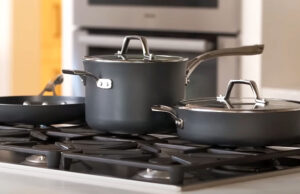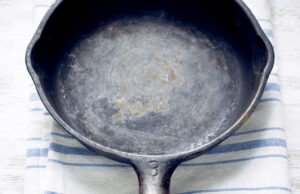As an Amazon Associate, I earn from qualifying purchases at no extra cost to you.
What Should I Do if My Oven Catches Fire? A Complete Guide
Ovens catching fire can happen more often than you’d think, and it’s a scary situation. But don’t worry, with the right knowledge, you can handle it calmly and safely. Whether it’s a small grease fire or something bigger, knowing the steps to take can prevent harm and help you save your home. In this guide, we’ll walk through everything you need to know about what to do if your oven catches fire, from prevention tips to what to do in case of emergency.
Immediate Steps to Take When Your Oven Catches Fire
When your oven catches fire, time is of the essence. But don’t panic! Staying calm will help you think clearly and act quickly. Let’s break down the immediate steps you should take if a fire starts in your oven.
1. Turn off the Oven Immediately
The first thing to do is to turn off the oven’s heat. This will stop the fire from getting worse and prevent more fuel from feeding the flames. Don’t open the oven door yet, as the fire might get more intense if it gets more oxygen. Simply turning off the oven will help you gain control of the situation without making it worse.
2. Close the Oven Door
Keep the oven door closed. This helps to trap the fire inside and prevent it from getting oxygen, which will limit the flames. Fires need oxygen to grow, so by keeping the door closed, you’re essentially suffocating the fire. This is a simple but effective way to manage a small fire.
3. Assess the Situation Quickly
After you’ve turned off the oven and closed the door, assess the situation carefully. If the fire is small and contained, it might burn out on its own without needing any more help from you. However, if the flames continue to grow, you’ll need to act more quickly. A small fire that’s contained in the oven is much easier to handle than one that spreads outside of it.
4. Do Not Use Water on an Oven Fire
It’s very important that you never use water on an oven fire, especially if it’s a grease fire. Water can cause the fire to spread or get bigger, making the situation much worse. Water can also cause dangerous steam explosions when it comes in contact with hot grease. Always avoid water in any kitchen fire scenario.
5. Use a Fire Extinguisher
If the fire continues to burn, the next step is to use a fire extinguisher. Make sure you have a Class K fire extinguisher, which is designed for kitchen fires, especially grease fires. A Class ABC fire extinguisher can also be used if you don’t have a Class K on hand. Hold the extinguisher with both hands, aim at the base of the fire, and use the PASS method: Pull the pin, Aim at the base of the fire, Squeeze the handle, and Sweep from side to side.
6. Evacuate If Needed
If the fire keeps growing or if you’re unable to contain it, it’s time to get out. Call the fire department immediately and leave your home. Do not try to handle a fire that’s gotten out of control. Fires can spread quickly, and your safety is the most important thing. Make sure everyone in the house is accounted for, and leave quickly without taking unnecessary risks.
7. Call for Help
Even if you think you’ve put out the fire, call the fire department to inspect your home. They can make sure that the fire is completely out and that there are no hidden hot spots that might reignite. It’s always better to be safe than sorry when dealing with a fire.
How to Prevent an Oven Fire in the First Place
Prevention is always the best approach when it comes to fire safety. Here are some practical tips to help you avoid an oven fire in your home. By staying aware and making a few changes in your cooking habits, you can significantly reduce the risk of your oven catching fire.
1. Regular Cleaning and Maintenance
One of the main causes of oven fires is a buildup of grease and food residue. Grease can easily ignite when it gets too hot, causing a fire. Make sure to clean your oven regularly, especially after cooking greasy foods. You can wipe the interior with a damp cloth and clean the oven racks. If there’s a lot of grease buildup, use a degreaser specifically designed for oven cleaning.
2. Keep Flammable Items Away from the Oven
It’s easy to forget about things around the oven, but flammable items like dish towels, paper towels, and oven mitts should be kept away from the stove and oven. These items can catch fire easily if they get too close to heat sources. Always make sure there’s a safe distance between flammable objects and your oven.
3. Use the Oven Properly
Avoid overfilling the oven with too much food or placing cooking utensils in places where they could catch fire. Also, make sure your oven is preheated properly before you put food inside. Overcrowding the oven can block air circulation, which increases the chances of something overheating and catching fire.
4. Install a Smoke Detector and Fire Extinguisher
Having a smoke detector and a fire extinguisher in your kitchen is essential for fire safety. Make sure your smoke detectors are working by testing them monthly and changing the batteries regularly. A fire extinguisher should be placed somewhere easily accessible in case of an emergency.
5. Avoid Leaving the Oven Unattended
It’s tempting to leave the kitchen while your food is cooking, but you should never leave the oven on and unattended. Fires can start very quickly, and you won’t be able to notice it right away if you’re not in the room. Always stay in the kitchen while cooking, and if you need to step away, make sure to turn off the oven first.
6. Use Oven Thermometers for Safe Cooking
Sometimes, fires occur because the oven temperature is set too high. If you’re unsure of the accuracy of your oven’s temperature, use an oven thermometer. This helps ensure that your oven is cooking food at the right temperature without overheating.
7. Know Your Oven’s Safety Features
Modern ovens come with various safety features like auto-shutoff functions or timers. Familiarize yourself with these features and use them to reduce the risk of a fire. For example, some ovens automatically turn off after a certain period of time, which can be helpful if you forget to turn off the oven.
Final Thoughts
I hope this article helped you feel more prepared in case your oven ever catches fire. By following the steps above, you’ll know exactly what to do and how to stay safe. Remember, the best way to handle a fire is by staying calm and following the right procedures. Prevention is key, so always maintain your oven and keep safety equipment nearby.
Frequently Asked Questions
Is it safe to open the oven door when there’s a fire?
No, it’s not safe to open the oven door. Opening the door lets in oxygen, which could make the fire worse. Keep the door closed until the fire is under control.
Can I use water to put out a grease fire in the oven?
No, water should never be used on a grease fire. It can make the fire worse and cause dangerous steam explosions. Always use a fire extinguisher or baking soda.
Do I need a special fire extinguisher for oven fires?
Yes, it’s recommended to have a Class K fire extinguisher for kitchen fires, especially grease fires. A Class ABC fire extinguisher can also be used if you don’t have a Class K.
Is it safe to leave the kitchen while the oven is on?
No, it’s unsafe to leave the kitchen while the oven is on. Always stay nearby while cooking, and turn off the oven if you need to leave.
Can a dirty oven cause a fire?
Yes, a dirty oven with grease and food residue can catch fire. Regularly clean your oven to prevent a buildup of flammable materials.
Is it necessary to call the fire department after putting out a small fire?
Yes, always call the fire department to inspect your home, even after a small fire. They can ensure there are no hidden fire risks.
Do I need to replace my oven after it catches fire?
It depends on the extent of the damage. If the fire is minor and contained, you might not need to replace the oven. However, if the damage is severe, consider replacing it.
Can a fire in the oven spread to other parts of the kitchen?
Yes, if not handled properly, a fire in the oven can spread. Always keep flammable items away from the oven and use safety equipment to contain the fire.



